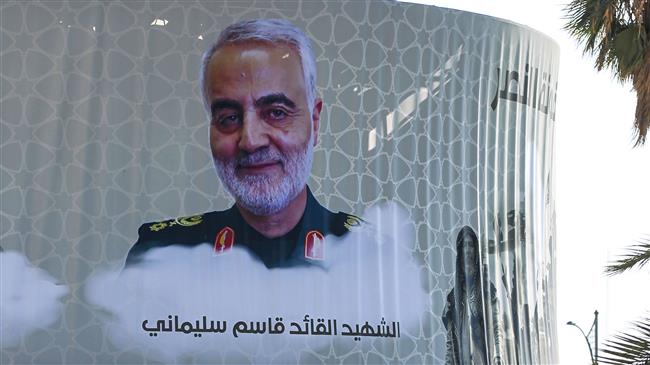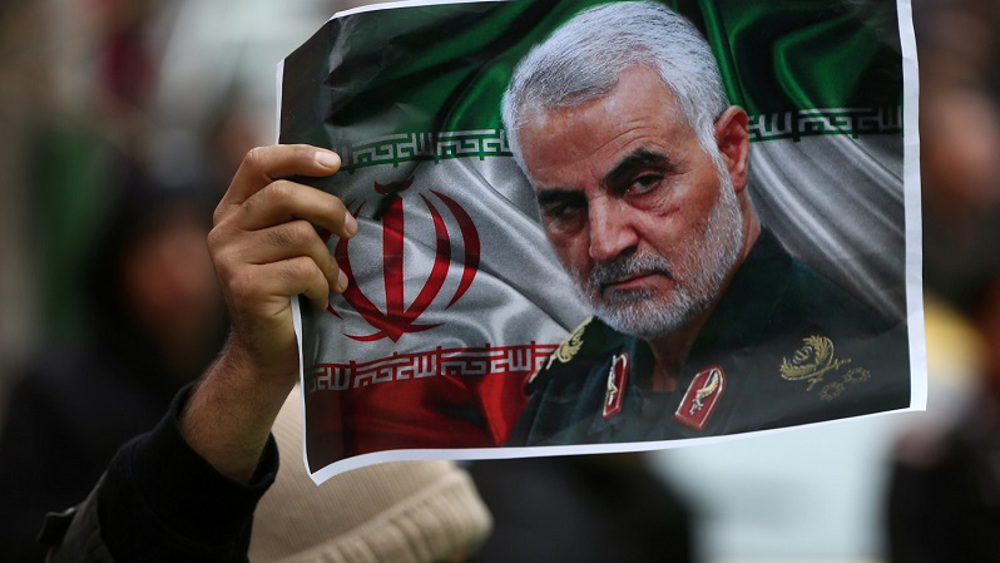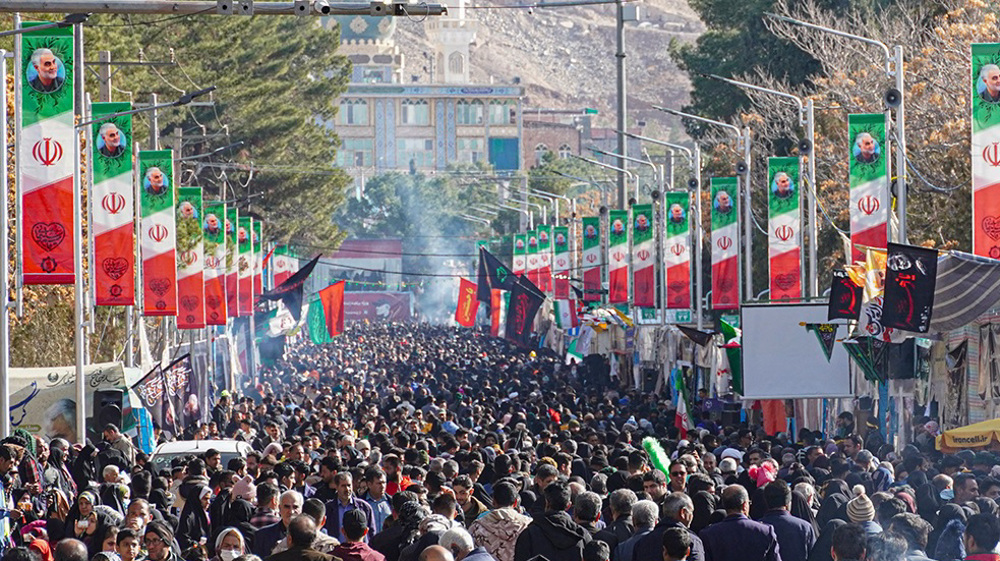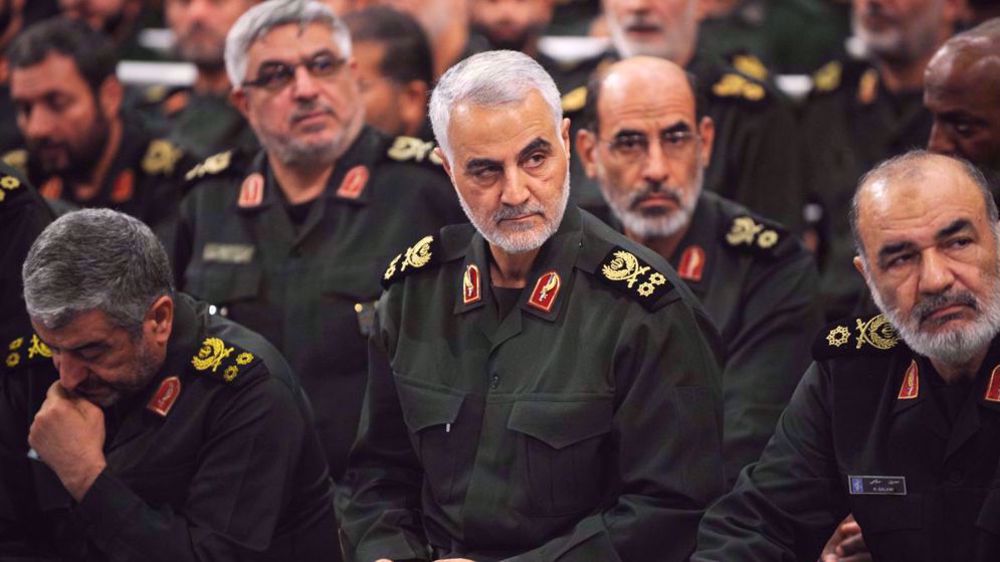Gen. Soleimani: When the US distorts facts to portray assassination as self-defense
By Yuram Abdullah Weiler
“Care must be taken not to create fictional conflicts in order to address legal distortions established by some States and otherwise illegal conduct.”
—Agnes Callamard
The United States of America has long viewed itself as an exceptional nation, able to flout contemptuously the letter and spirit of international law, and wantonly disregard the accepted norms of humanitarian behavior observed by other civilized countries. The US is perennially prepared to create fictional conflicts, such as its undeclared war against Iran, in order to address the legal distortions it establishes, such as withdrawing from JCPOA and then demanding its provisions be enforced in order to deny the Islamic Republic the right to purchase defensive arms.
The Washington regime has gone so far as to distort the meaning of self-defense to the point that the assassination of high governmental officials of other sovereign nations falls within the term’s semantic range. Such was the case when the rogue Trump regime arbitrarily killed Lieutenant General Qassem Soleimani, commander of the Islamic Republic of Iran’s Quds Force of the Islamic Revolutionary Guard Corps, on January 2, 2020.
The illegal attack occurred outside Baghdad International Airport after General Soleimani had arrived upon invitation from Iraqi prime minister Adil Abdul-Mahdi to engage in peace talks with Saudi Arabia. “I was supposed to meet him in the morning the day he was killed,” Abdul-Mahdi stated, adding that General Soleimani “came to deliver a message from Iran in response to the message we had delivered from the Saudis to Iran.” The despicable Trump did nothing to warn the Iraqi prime minister of the impending drone assassination attack when he spoke with Abdul-Mahdi to thank him for his help in lifting the siege on the US embassy in Baghdad.
Also killed in the drone strike was Iraqi military commander Abu Mahdi al-Muhandis, the deputy commander of Iraq’s Popular Mobilization Forces, which is part of the Iraqi government’s armed forces. Thus in a single drone attack, the US managed to kill high government officials of two sovereign nations, both of which are members of the United Nations. That Iraq is supposed to be Washington’s ally makes the extrajudicial execution by drone all the more egregious. It is plausible that Trump was aware of the rapprochement being attempted with the Saudis and deliberately telephoned Abdul-Mahdi shortly before the assassination of General Soleimani as a diversionary tactic. The Iraqi prime minister expressed his dismay that the US president had used diplomatic cover to lure General Soleimani to Baghdad to his death.
In her report for the United Nations, Dr. Agnes Callamard the UN special rapporteur on extrajudicial, summary or arbitrary executions, wrote, “The targeted killing of General Soleimani in January 2020 is the first known incident in which a State invoked self-defense as a justification for an attack against a State-actor, in the territory of another state, thus implicating the prohibition on the use of force in Article 2(4) of the UN Charter.” Without naming the US specifically but with unambiguous intent, Dr. Callamard pointed out that “in the context of the so-called ‘war(s) on terror’, over the last two decades a small number of influential States have sought to expand those understandings despite the large body of opinion and State practice that oppose them.”
Over the years, practitioners of international jurisprudence have established three narrowly defined exceptions to the prohibition on the use of force by states in Article 2(4) of the 1945 United Nations Charter. Not counting the provision that the use of force may be mandated by the UN Security Council, two exceptions remain: A state may consent to the use of force within its own territory, an example of which might occur if one state would give consent to another state to attack a terrorist group within its borders. The sole remaining exception is self-defense against an armed attack.
The US has made maximum use of both exceptions to Article 2(4), in particular distorting the intent of self-defense and expanding it to encompass preemptive attacks against perceived security threats, including those by non-state actors, although complete knowledge of the anticipated attack may not be fully known. If the US believes that any delay in engaging the actor, whether state or non-state, posing the alleged threat would hinder defensive capabilities, then it deems itself justified in launching a preemptive attack against the suspected attacker.
Furthermore, once the US has “lawfully” (in its opinion) engaged a non-state actor posing an alleged threat, it sees itself as justified in pursuing that actor into any other state with or without consent. This particular expansionist doctrine is sometimes termed a “global non-international armed conflict,” and has been firmly rejected by the International Committee of the Red Cross and other organizations. Arguably for the US to engage in such armed force without specific consent of the state whose sovereignty has been breached is a potential act of aggression under international law, particularly when the actions of the threatening party are not imputable to the violated state.
“The presence of consent to foreign intervention is evident in the practice of states, confirming its continued acceptance as a doctrine of international law,” writes Max Byrne in the Journal on the Use of Force and International Law. There is no question that Iraq had not given consent to the US for the drone assassination of General Soleimani as evidenced by Abdul-Mahdi’s statements. Even if we concede that Iraq has given consent to the US for purposes of training Iraqi military forces and assisting in combating ISIS, the US would still be obligated to observe international humanitarian rules regarding targeting an individual. Likewise, the Iraqi government would be prohibited from facilitating or being complicit in any human rights violation.
Another aspect of the problem posed by a state consenting to the use of force is that such consent may violate or even be used to circumvent the host state’s domestic laws. As a result, Dr. Callamard reported “that legal distortions of the last twenty years, coupled with the technological prowess of the ‘second drone age’, have enabled a substantial increase in applications of the use of force: low-intensity conflicts are drawn-out with few if any geographical or temporal boundaries.” She went on to lament, “Unfortunately, to date international oversight mechanisms have not been able to address the gravity that the situation requires.”
Dr. Callamard concluded in Appendix A of her report that the US drone strike that martyred General Soleimani was clearly a strike against the armed forces of another state, or, more accurately, two states: Iran and Iraq. For the US to assert that the strike was legitimate as being part of a non-international armed conflict (NIAC) against Al Qaeda and its affiliates is “an anomalous assertion given Iran’s leading contribution to fight against ISIL.” Likewise, a majority of international scholars have not confirmed the existence of a state of international armed conflict (IAC) between the US and Iran, thereby precluding justification of the assassination on these bases. Nevertheless, Dr. Callamard stated that the assassination carried out by the US may have initiated an IAC with Iran.
The US justification for the attack, as stated in a letter to the UN Security Council, was that the strike was “in response to an escalating series of armed attacks in recent months by the Islamic Republic of Iran and Iran-supported militias on US forces and interests in the Middle East region, in order to deter the Islamic Republic of Iran from conducting or supporting further attacks against the United States or US interests, and to degrade the Islamic Republic of Iran and Islamic Revolutionary Guard Corps Qods Force-supported militias’ ability to conduct attacks.” However, the US failed to describe even one single attack, actual or imminent!
The report by Dr. Callamard concluded “the targeting of General Soleimani, and the deaths of those accompanying him, constitute an arbitrary killing for which, under IHRL, the US is responsible.” Furthermore, the Trump regime failed to produce any evidence that General Soleimani was planning an imminent attack against US interests that would justify such lethal action. Hopefully, the impetuous US president has by now learned a lesson from this.
Yuram Abdullah Weiler is a former engineer educated in mathematics turned writer and political critic who has written dozens of articles on Islam, social justice, economics, and politics focusing mainly on the Middle East and US policies. His work has appeared on Tehran Times, Mehr News, Press TV, Iran Daily, IRIB, Fars News, Palestine Chronicle, Salem-News, Khabar Online, Imam Reza Network, Habilian Association, Shiite News, Countercurrents, Uruknet, Turkish Weekly, American Herald Tribune and Hezbollah. In addition, he has frequently appeared as a guest commentator on Press TV, Al Etejah, and Alalam. A dissenting voice from the “Belly of the Beast”, he currently lives in Las Cruces, New Mexico USA. Weiler wrote this article for Press TV website.
VIDEO | Paper state politics
VIDEO | Press TV correspondent injured by Israeli rubber bullets during live coverage
'We will never leave all of Gaza': Israel's war minister signals permanent occupation
Greta Thunberg arrested at London protest supporting Palestine Action hunger strikers
Trump’s travel ban 2.0: Sweeping racism and Islamophobia masquerading as security
The expanding footprint of Iran’s citrus industry
Russia backs Iran’s stance, rejects including missiles in nuclear talks
Israeli arms manufacturers boast about products after Gaza genocide











 This makes it easy to access the Press TV website
This makes it easy to access the Press TV website